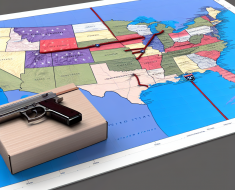How State Preemption Laws Affect Local Gun Ordinances

The debate over gun control in the United States often takes place on multiple levels of government, from the federal to the state and local levels. While local governments may seek to enact ordinances tailored to their community’s specific needs and safety concerns, state preemption laws frequently limit their ability to do so. These laws, which prevent local jurisdictions from enacting regulations that are stricter than state law, have a profound impact on how gun policies are implemented across the country.
This article explores the nature of state preemption laws related to firearms, how they affect local gun ordinances, and the broader implications for public safety and governance. Through case studies, statistical data, and legal analysis, we will uncover the complexities and controversies surrounding this critical issue.
Understanding State Preemption Laws in Gun Regulation
State preemption laws are statutes or constitutional provisions that prohibit local governments from passing regulations that conflict with or exceed state laws. In the context of firearms regulation, these laws ensure that gun policies are consistent statewide by limiting local autonomy.
Preemption can take different forms:
- Express Preemption: The state explicitly prohibits localities from regulating firearms beyond state law.
- Implied Preemption: Courts infer preemption when local laws conflict with the intent or purpose of state law.
- No Preemption: Some states allow local governments to regulate firearms independently.
The rationale behind state preemption includes concerns about regulatory uniformity, avoiding confusion for gun owners traveling between jurisdictions, and protecting Second Amendment rights as interpreted by state legislatures. However, critics argue that it undermines local democracy and ignores varying community needs.
The Impact of Preemption Laws on Local Gun Ordinances
Local governments often attempt to address specific public safety challenges through tailored gun ordinances. These may include restrictions on firearm possession in sensitive areas, licensing requirements, safe storage mandates, or limits on certain types of weapons or accessories. However, when state preemption laws are in place, many of these initiatives are blocked or invalidated.
Key effects of preemption include:
- Limiting Innovation: Localities cannot pilot unique approaches or experiment with regulations suited to their population’s needs.
- Legal Challenges: Cities enacting stricter measures risk costly lawsuits from gun rights groups or even their own states.
- Diminished Local Control: Governments lose flexibility to respond to rising violence or public demand for tighter restrictions.
- Uniformity vs. Diversity: While uniform laws simplify compliance for residents and law enforcement, they may fail to address localized issues effectively.
An example is found in cities experiencing higher rates of gun violence seeking stronger ordinances but being restrained by overarching state policies favoring permissive firearm regulations.
Case Studies: State Preemption in Action
1. Chicago, Illinois
Chicago has long battled high rates of gun violence and attempted numerous local ordinances aimed at curbing firearms-related crimes. However, Illinois has a complex legal framework regarding preemption.
While Illinois generally permits some degree of local regulation—such as bans on assault weapons and magazine capacities—state law also imposes restrictions on what municipalities can enforce independently. For example, in 2013 Illinois passed a concealed carry law that included explicit provisions preventing municipalities from banning concealed carry licenses within city limits. This limited Chicago’s ability to impose more restrictive carry rules than those enacted at the state level.
This tug-of-war demonstrates how even in states with moderate preemption laws, local governments face significant constraints on tailoring their gun policies fully according to community demands.
2. Texas
Texas is notable for its strong preemption stance regarding firearms regulation. The state’s legislature has passed some of the strictest preemption statutes in the nation prohibiting nearly all forms of local firearm regulation beyond what is allowed by state law.
This means cities like Austin or Houston cannot enact ordinances related to background checks beyond those mandated statewide or restrict carrying guns in public spaces more stringently than Texas law permits. For example:
- Austin’s attempts to ban open carry were invalidated by state courts citing preemption statutes.
- The Texas Attorney General’s office has aggressively pursued legal actions against municipalities imposing unauthorized regulations on firearms possession or use.
This approach underscores Texas’ prioritization of uniform firearm rights over localized restrictions and highlights tensions between urban centers facing different safety challenges compared to rural areas.
3. California
California presents a contrasting example where strong statewide firearm regulations coexist with allowances for some degree of local control. Although California enforces comprehensive gun control measures through its legislature—such as universal background checks and assault weapon bans—cities and counties retain authority over certain aspects like regulating gun shows or imposing additional storage requirements under specific circumstances.
This hybrid model allows for both uniform protections across the state and targeted efforts by municipalities most affected by gun violence while still maintaining overall coherence within California’s legal framework.
The Political and Legal Battles Surrounding Preemption
The issue of firearm preemption is deeply political and often reflects broader ideological divides over Second Amendment rights versus public safety priorities. Advocacy groups on both sides actively lobby for changes at the state level affecting preemption policies:</








